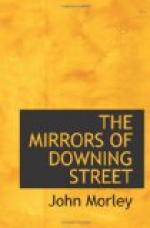Democracy, nursing what it deems to be its economic wrongs, and not unnaturally regarding the wealthy classes with bitter anger, has yet to learn that capital was largely the creation of the Puritan character, and that the prosperity of these British Islands was laid in no small measure by the thrift and temperance of those who lived simply because they thought deeply. Capital, without which Labour could have done little, is not a contrivance of the noisy rich, but the deliberate creation of virtuous men. Capital, now regarded as an enemy, was once the visible best friend of Labour.
Where is there now among the possessing classes an example even of simplicity in dress, modesty in behaviour, temperance in conduct, and thrift in living? As for any higher example—an example of wisdom, duty, self-sacrifice, and moral earnestness—it is nowhere visible in our national life to those who look upward.
Until we recover this ancient spirit our politics must continue their descent to the abyss, and democracy will listen to the corrupting delusions of the economic Socialist.
We need the Puritan element in our characters, the Hellenic element in our minds, and the Christian element in our souls. We must set a higher value on moral qualities, on intellectual qualities, and on Christian qualities. We must learn to see, not gloomily and heavily, but with joy and thanksgiving, that our world is set in the midst of an infinite universe, that it has a purpose in the scheme of things, that we are all members one of another, and that there is no grandeur of character, mind, or soul which can ever be worthy of creation’s purpose.
Less flippancy in the world would lead to more seriousness, more seriousness would lead to greater intelligence, and greater intelligence would lead to nobler living.
“The cure for us,” said George Sand, “is far more simple than we will believe. All the better natures amongst us see it and feel it. It is a good direction given by ourselves to our hearts and consciences.”
Let each man ask himself, Is my direction worthy of man’s past and hopeful for his future?
* * * * *
“An instantaneous success”
+Mirrors of Washington+
+Anonymous+
Octavo. Portraits
+HARDING+ It does to our great and near-great +WILSON+ what the “gentleman with a duster” +HUGHES+ did to eminent Englishmen in “The +HARVEY+ Mirrors of Downing Street.” It tells +HOUSE+ painfully plain truths about the personalities +HOOVER+ of those in whose hands our +ROOT+ destinies lie or have lain. It is searching +LODGE+ in its analyses, and contains fourteen +BORAH+ discerning, piercing, sometimes +KNOX+ satirical, always brilliant, character +PENROSE+ studies. “And,” says the N.Y. Eve. +LANSING+ Post, “it contains indiscretions delicious




